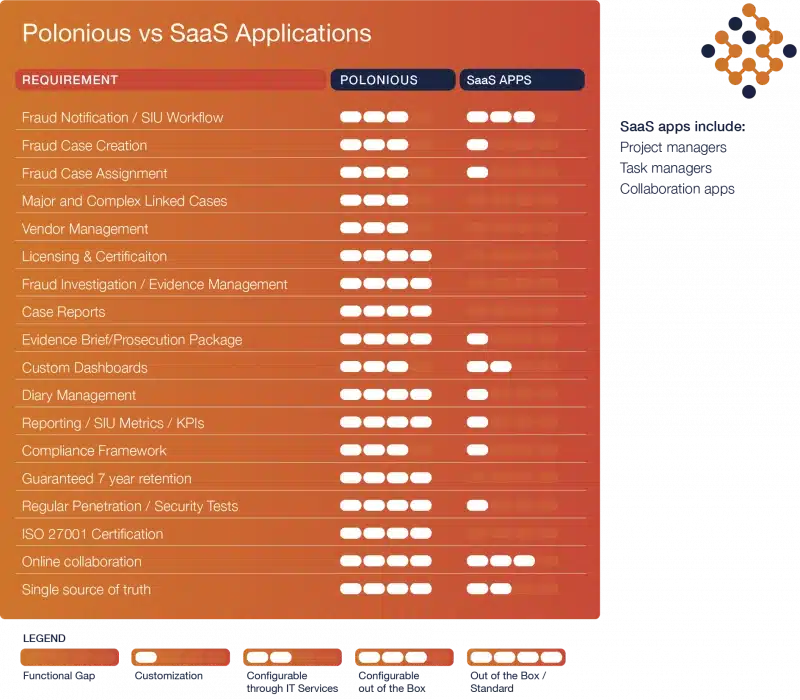Many organisations end up relying on SaaS and other project management apps to handle their case and investigation management.
In the race to collaborate quickly, project managers offer an easy way to start a case management journey, but fall short when it comes to the complexity of properly dealing with investigations.
Let’s take a look at how project management apps fail to offer the features and compliance of an investigation management system.

Project management apps
Starting from scratch
If your team is tasked with managing projects that relate to customer case and investigations then SaaS project management apps like Trello and Basecamp look like great starting points.
Teams realise they need something that is online and collaborative, and all members need to work together. They also realise that it is a case management and workflow challenge they are facing, which are often not met by office documents.
Project management apps often have complete to-do lists, the ability to record statuses, and can add participants in an ad-hoc manner: All of which are key attributes you need in an investigation system.
Many also allow you to collect artifacts like images, videos and documents.
SaaS project managers are generally available and people will use them because they require little, if any, procurement process. They are used throughout the business for general things like customer support, which can morph into “case management”.
This is how organisations typically end up using SaaS project managers for case and investigation management.
Discovering the drawbacks
While easy to procure, and offer some positives, there are numerous disadvantages with project management apps for investigation management.
What they generally lack is rigour. One of the key things in investigations is understanding how you arrived at the conclusions you make.
At numerous steps along the way key decisions have to be recorded as to whether you proceed or don’t proceed and how you proceed in an investigation. And the people making those decisions and their reasoning have to be auditable.
Project managers generally follow a predefined process, but those processes are not designed to ensure procedural fairness, regulatory compliance or track provenance of evidence collected.
They also lack the detailed compliance requirements and controls which would have to be added into the system and maintained separately.
For example, project managers often enable users to delete comments and documents without having a full audit trail, or the ability to recover those documents.
But I’m already using a project manager for investigations…
If you are already using project management apps for investigations then you need to be wary of the pitfalls.
At their core project managers address some of the requirements for investigation management, but they lack the focus of an investigation management tool miss many of the features you would find in a dedicated application.
The reality is there are not many benefits to using a project tool for investigation management as they quickly struggle with the intended purpose and often lack the ability to cross reference entities that are involved in multiple cases.
For example, simple things like sharing documents and applying security often results in you having to apply this to every case which requires a lot more manual work.
Moving up to dedicated investigation management
If you find yourself using a project manager for investigations look at moving to a purpose built system to avoid a lot of headache and compliance problems in the future.
A big problem is getting the case data out of the SaaS project management app and then being able to use it for better investigation management, so be wary of that if your team is starting to rely more on project managers.
Another thing to note is separating the cases that have more compliance requirements, these are likely to demand proper investigation management as you grow.
Additional steps to take include:
- Identify the key risks that need to be managed within the process such as the ID of vulnerable people, protection of whistleblowers, regulatory reporting requirements.
- If you need to conduct cases within a legislative framework.
- Getting the right stakeholders. Are the right people in your organisation seeing the case data and what should be deemed an investigation?
It is rare that a project management tool has the ability to share data well outside the project team.
Polonious can share data with all of the participants involved appropriately whether they are working as part of the team; line managers or senior management; or external suppliers and vendors; and even participants in the process such as claimants and customers.
With proper investigation management you can be transparent without exposing restricted data outside those who should have access.
Let's Get Started
Interested in learning more about how Polonious can help?
Get a free consultation or demo with one of our experts
Polonious Team
Polonious is a market-leading case and investigations management application, which is designed to improve business workflow, while keeping up with the constantly changing regulatory environment.




